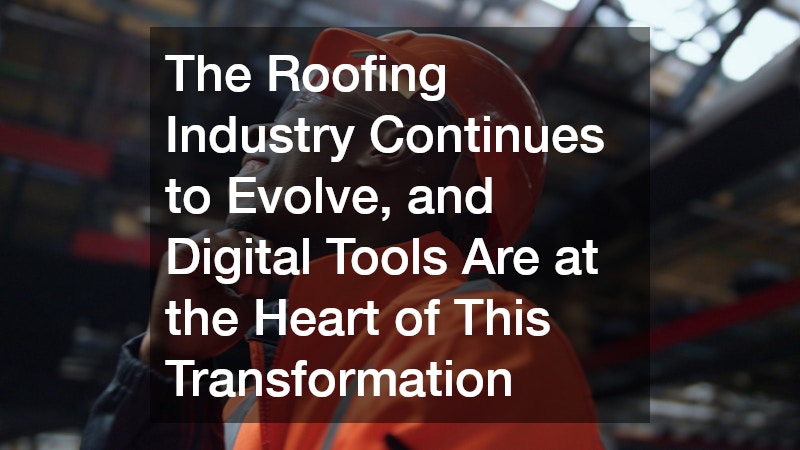In today’s fast-paced construction industry, technology has become an essential part of daily operations. Roofing contractors, once heavily reliant on manual methods, now benefit from an array of digital tools that streamline workflows, improve accuracy, and enhance customer communication. From project management software to advanced measuring applications, these tools are changing the way roofing projects are planned and executed. Understanding which digital resources are the most useful can help contractors work more efficiently while delivering better outcomes for their clients.
Project Management Software
One of the biggest challenges in roofing is coordinating multiple tasks, crews, and timelines. Project management platforms such as Buildertrend, Procore, or JobNimbus have become indispensable for roofing contractors. These systems centralize all project information—schedules, budgets, client communications, and work orders—into one easy-to-access location.
With mobile functionality, contractors can manage projects on-site, track progress in real-time, and ensure every team member is aligned. The result is fewer delays, better accountability, and improved client satisfaction.
Digital Measuring and Estimating Tools
Accurate measurements are critical for roofing projects, but traditional methods can be time-consuming and prone to error. Today, roofing contractors often rely on digital measuring tools and software such as EagleView or Hover. These applications use aerial imagery, drones, or 3D modeling to provide precise measurements of roofs. Contractors can generate detailed reports, create accurate estimates, and reduce the risk of material waste. This technology not only saves time but also enhances professionalism by giving clients clear and reliable estimates before work begins.
Drone Technology
Drones have revolutionized the roofing industry by providing a safe, efficient way to inspect and survey roofs. Instead of climbing ladders and risking safety, contractors can deploy drones to capture high-resolution images and videos. These visuals help identify damage, track progress, and document completed work for insurance claims or customer records. Roofing contractors using drone technology gain a competitive edge, as it allows them to conduct faster assessments and share visual data with clients, improving transparency and trust.
Customer Relationship Management (CRM) Systems
Maintaining strong client relationships is vital in the roofing business. CRM systems such as Salesforce or AccuLynx enable roofing contractors to manage customer data, track leads, and follow up on potential projects. By automating tasks like email reminders, appointment scheduling, and customer communication, CRM platforms ensure no opportunities are missed. Additionally, they help contractors provide personalized service by keeping detailed records of past interactions, project history, and customer preferences.
Mobile Apps for Field Communication
Effective communication between office staff and on-site crews is crucial for keeping projects on schedule. Mobile apps like Slack, Microsoft Teams, or even specialized construction communication tools provide instant messaging, file sharing, and video conferencing. Roofing contractors can use these apps to quickly resolve issues, share updates, or provide instructions without requiring time-consuming phone calls or in-person meetings. Improved communication helps reduce misunderstandings and increases productivity on the job site.
Accounting and Financial Software
Running a roofing business involves more than just installation and repair work. Contractors must also handle finances, payroll, and invoicing. Digital accounting tools like QuickBooks, FreshBooks, or specialized construction accounting software simplify these processes. These platforms track expenses, generate invoices, and provide financial reports that give roofing contractors better insight into their business performance. By automating financial tasks, contractors can save time, reduce errors, and focus more on delivering quality roofing services.
Safety and Training Platforms
Safety is a top priority in roofing, and digital tools are making it easier to train and protect workers. Online platforms such as SafetyCulture or OSHA training apps provide accessible resources for compliance, training, and reporting. Contractors can track safety inspections, log incidents, and share best practices with their teams. Digital safety tools not only protect workers but also reduce the risk of costly accidents and liabilities.
Cloud Storage and File Sharing
Roofing projects often involve detailed plans, photos, permits, and contracts that need to be shared quickly and securely. Cloud storage platforms like Google Drive, Dropbox, or OneDrive allow roofing contractors to store and access files from anywhere. With secure sharing options, contractors can collaborate with clients, insurance adjusters, or team members without delays. Centralized file storage ensures important documents are always available when needed, improving efficiency and organization.
The roofing industry continues to evolve, and digital tools are at the heart of this transformation. From project management software to drones and CRM systems, these technologies give roofing contractors the ability to work smarter, safer, and more efficiently. By embracing these tools, contractors can improve accuracy, strengthen customer relationships, and gain a competitive edge in a demanding market. As technology advances, roofing professionals who adapt will be better equipped to deliver high-quality results that meet the expectations of today’s homeowners and businesses.




